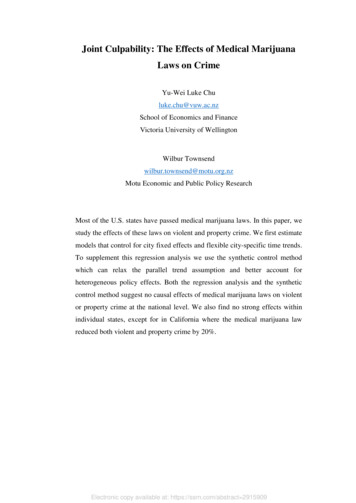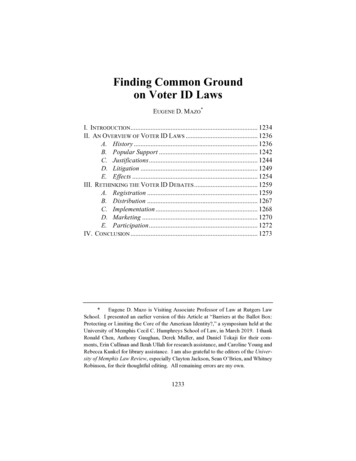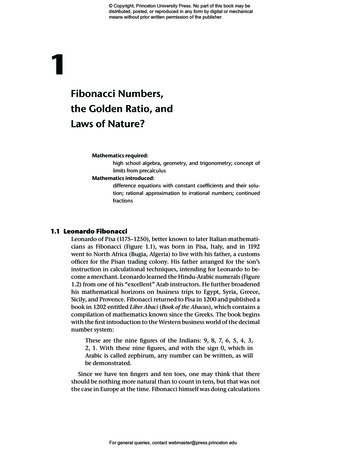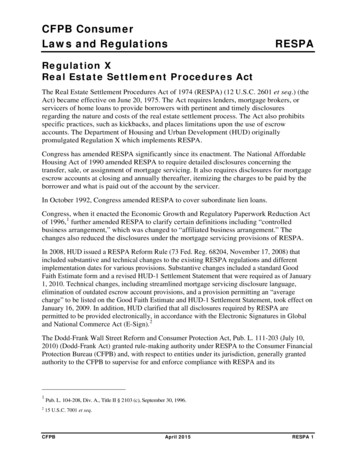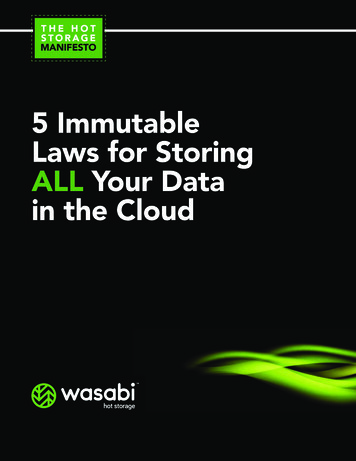
Transcription
THE HOTSTORAGEMANIFESTO5 ImmutableLaws for StoringALL Your Datain the Cloud
1 Make it as simple as buying electricityAre you confused by all the different tiers and pricing models in the cloud storage industry? S3 Standard,Infrequent Access, Glacier, Nearline, Coldline, Reduced Redundancy, Redundant Redundancy (ok, we made upthat last one). The point is, it shouldn’t be that complicated.The power outlets in your home or office don’t serve up different qualities of electricity, right? Why shouldcloud storage be any different?It’s time to say goodbye to these silly, artificially priced storage tiers.PREMIUM Electricity(Expensive)NOT BAD Electricity(Cheaper)CRAPPY Electricity(Really cheap)We believe that cloud storage should be as simple and ubiquitous as a utility: One price. One speed. Payfor what you use. In order for one universal storage product to meet the needs of nearly every application, itwould need to be faster than the fastest tier available today, cheaper than the cheapest, and more reliable thanall of them combined.One price:BARGAIN!/One speed:BLAZING!/One level of reliability:BULLETPROOF!2 Don’t let price determine what data you save,and what you throw away.The cost of cloud storage is holding back the true potential of Big Data. Whether it’s the massive amountof scientific data from the Large HADRON Collider, or video feeds from the burgeoning number ofsurveillance cameras, we all know there’s gold in that data. And we’re getting better at mining it. Sadly, muchof it gets thrown away because storing it is simply too expensive. How many discoveries lay hidden due totossed data? How many crimes are left unsolved because critical evidence was deleted simply due to theprohibitive cost of keeping it?These same cost pressures are also stifling innovation in the commercial sector, whether it’s buyer behaviordata from retail and e-commerce platforms, or safety data collected from sensors on jet engines, automobiles,and factory floors. Think of all those free social and mobile applications that require large communities ofusers before ever realizing a dime in advertising revenue—especially storage-intensive ones, like photo andvideo-sharing services. How many great apps are only in the minds of their creators because today’s storageprices don’t give them the runway they need to turn a profit, if they can at all? In an era where anyone with anidea and some coding experience can become the next digital economy millionaire, it doesn’t seem right thatthe cost of big data storage should dash an entrepreneur’s big data dreams.THE HOT STORAGE MANIFESTO
The high price of cloud storage is forcing us to literally delete opportunities.and cash. By driving downcosts, data-intensive applications will make more economic sense, and the promise of Big Data willfinally be fulfilled.Wasabi is 6x faster and 1/5 price of Amazon S3.Visit wasabi.com for pricing and performance comparison details.3 Rethink the meaning of fast.Money’s no object? That’s great. We’re happy for you. But if you can’t get your data in and out of storage fastenough, it doesn’t matter what the price is. If you’re generating 10 terabytes of data per day, but your databasecan only write 5 terabytes per day, you’re up the creek.Big data requires big speed. Problem is, the definition of “big” has changed considerably in the last ten years.When Amazon launched S3 in 2006, no one could imagine that generating and storing a petabyte of datawould be considered routine a decade later. Moving that much data into and out of storage quickly requires anentirely different approach to object storage.Wasabi uses a totally new, highly parallelized storage architecture that is designed for extremely highthroughput. Out of the starting blocks, we’re about six times faster than S3. Over time, our architecture willallow us to pull even further ahead, so large data sets can be written and retrieved faster than ever.AWS S3GoogleWasabiWasabi’s time to first byte is 15ms. Way faster than Amazon S3.THE HOT STORAGE MANIFESTO
4 Counting nines won’t prevent data loss.Amazon S3 and Wasabi Hot Storage both boast 99.999999999% of durability. That’s a lot of nines. Eleven,to be exact. If you stored 1 million one megabyte files, you could expect to lose one file every 659,000 years.Given these numbers, you’d think people would never lose data. But it happens every day.Just making ever-more-reliable and redundant storage servers will never solvethe problem. That’s because it’s not a technology issue. it’s a human one.Today, the vast majority of data loss is due to dumb mistakes, “fat fingers,”accidental overwrites, sabotage and cyberattacks. The recent fiasco atAmazon that took down a large portion of the web was the result of humanerror (1). The Oakland, Calif., police department managed to accidentally delete25 percent of its body cam videos (2). Hundreds of companies have been hitwith ransomware attacks, making their data inaccessible until they paid ahandsome price to get it back. Ransomware was up 400 percent in 2016 andis projected to double again in 2017 (3). A cloud-based storage system couldhave a million nines of durability and it wouldn’t prevent any of these losses.Immutability is real-world data protectionWasabi Hot Storage solves for these problems with something called “immutability.” Immutability means thatany data, once written, cannot be deleted or modified by anyone. Not by you, not by a hacker, not even byone of our employees. It means that no matter what happens, or who breaks into your network with badintentions, your data is always safe.With immutability, once you decide to store something, it stays stored for the predetermined life of that data.Amazon doesn’t have this option of creating immutable buckets. Wasabi does because our roots are in thebackup industry, where all we thought about was real-word data protection.5 Embrace open standards and avoid vendor lock-in.The cloud storage industry is experiencing a standards war reminiscent of the VHS vs. Betamax wars in theearly days of home video. Amazon, Google, and Microsoft each have their own competing APIs, but it’sinevitable that a standard will emerge. Standards create open markets, where products compete on an equalplaying field by offering the best value. Open competition forces performance improvements, and drives downcosts for the consumer. Standards also free developers from vendor lock-in, enabling them to easily switchfrom one cloud storage vendor to another without having to rewrite their applications.Amazon is far and away the market leader, and their S3 API is rapidly becoming the de facto standard.Products like OpenStack and Google’s API are already quite similar to Amazon’s, though far from plugcompatible.THE HOT STORAGE MANIFESTO
Wasabi’s API was purpose-built to be 100 percent bit-compatible with the S3 API. We run compatibilitytests with third-party applications designed to store data in S3, including backup products and variousgateways, to make sure that you can literally unplug Amazon and plug in Wasabi, and everything still workswithout rewriting any code.Of course, this compatibility means you could just as easily switch back to Amazon (but for 6x the speed at1/5 the cost, we’re not sure why you would want to.)Another way that vendors try to lock you into their proprietary storage is through punitive pricing. The mostnotorious of these is Glacier, where the amount of data you can withdraw each day is severely limited.Consequently, if you store your data in Glacier, it could be prohibitively expensive to move to another cloudstorage vendor. Consider the following post from a Y Combinator blog:WARNING: Retrieval Fee“Beware that retrieval fee! The retrieval fee for 3TB could be as high as 22,082 based on myreading of their FAQ. The math would work as follows:After uploading 3TB (3 x 2x40 bytes) as a single archive, your retrieval allowance would be 153.6 GB/mo (3TB x 5%), or 5.12 GB/day (3TB x 5% / 30). Assuming this one retrieval was the only retrievalof the day, and as it’s a single archive you can’t break it into smaller pieces, your billable peak hourlyretrieval would be 3072 GB - 5.12 GB 3066.88 GB.Thus your retrieval fee would be 3066.88 x 720 x .01 22,081. (719x your monthly storage fee).” (4)We're opposed to vendor lock-in of any kind. Wasabi charges a flat egress fee of .04/GB. This is lower thanthe lowest of Amazon's variable S3 egress fees, which can reach as high as .09/GB based on monthlyvolume. However, if you decide to download all your data and close your Wasabi account, we'll reimburse youfor whatever amount you were charged for migrating your data out of Wasabi. Why should anyone have to payto stop using someone's service? We hate that.“You can’t have everything. Where would you put it?”–Steven WrightTHE HOT STORAGE MANIFESTO
Store it all with Wasabi Hot StorageWe think the days of a handful of industry giants battling it out to lock customers into theirproprietary storage systems is limited. As it should be. Virtually every application requiresstorage, and the world’s storage needs are only increasing.Big data analytics and the Internet of Things (IoT) promise a new era of business insight,automation, safety, and productivity. But not if the price and speed of cloud storage preventsus from storing the vast amounts of data these connected devices will produce.At Wasabi, we believe that storage should be simple, inexpensive, interchangeable,reliable, and readily available to anyone who needs it. Just like bandwidth or electricity.Oh, and blazing fast. Like melt-your-eyeballs fast.Try it for FreeTry storing up to 1 terabyte of your data for free for 30 days on Wasabi.Create an account today for a 30-day free trial.We’re cloud storage specialists.Wasabi was co-founded by cloud storage pioneers David Friend andJeff Flowers, the founders of Carbonite, the world’s leading provider of simpleand affordable backup. Unlike other vendors who want your whole data centerin their cloud, cloud storage is all we do.We’re not interested in changing the world.Just the way the world stores its data.www.wasabi.comFootnotes1) a-delete/2) and3) -double-in-2017-study/article/634560/4) https://news.ycombinator.com/item?id 4412886THE HOT STORAGE MANIFESTO
BARGAIN! / / The high price of cloud storage is forcing us to literally delete opportunities.and cash. By driving down costs, data-intensive applications will make more economic sense, and the promise of Big Data will finally be fulfilled. 3 Rethink the meaning of fast. Money’s no object? That’s great. We’re happy for you. But if you can’t get your data in and out of storage fast .

